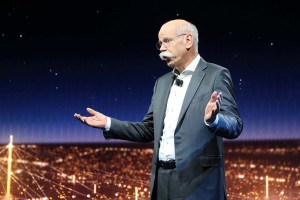
Daimler's Dieter Zetsche said the company is using its financial strength to meet the often contradictory challenges it faces.
Daimler AG continues to use its financial strength to push innovation as it faces the multifaceted challenges that often seem to be pulling the auto industry in opposite directions, the company’s top executive told the company’s shareholders at the automaker’s annual meeting in Berlin.
“We demonstrated once again in 2016: The combination of financial strength and innovativeness is stronger than ever at Daimler,” said Daimler CEO Dieter Zetsche.
“At the same time, we initiated the biggest transformation in our company history last year,” Zetsche said as Daimler is developing further from a position of strength for the next generation of customers, employees and shareholders.
Zetsche said the future of the car industry is challenged by electric drive versus combustion engines, autonomous driving versus driving pleasure, owning a car versus shared mobility, or human versus robot.
Mobility will become even more multifaceted: “It is necessary to do one thing without stopping with the other. That’s why we are strengthening both: the new and the old,” Zetsche said.
In the coming years, the company will invest €10 billion in the expansion of its electric portfolio and will bring more than ten new electric cars in series by 2022.
On the way to emission-free driving, all available means will be utilized to reduce CO2 emissions. For this reason, efficient combustion engines will continue to be a significant element of the solution during the transitional period.
(Mercedes may enter U.S. pickup market, after all. Click Here for the story.)
A key bridge technology along the way to electric mobility is plug-in hybrid drive, with which Mercedes-Benz already has eight models on the market. The next technology leap will soon follow with the new S-Class as a plug-in hybrid.
Zetsche added Daimler is focused the development of the latest lithium-ion technology. In 2016, Daimler presented the Urban eTruck, which will be launched this year as a small series. Zetsche said: “We believe in the simple principle: Alternative drive systems must be attractive drive systems.”
Another of Daimler’s focus is on the development of autonomous driving.
The car has always been more than just a means of transport, and autonomous driving will allow a new dimension of individual freedom and safety. Already today, series-produced cars from Mercedes-Benz can, if the driver desires, independently change lanes, apply the brakes in an emergency, or park themselves. As well as cars, the trucks and buses from Daimler are also pioneers for autonomous driving in their respective sectors, he noted.
(Click Here for more about Daimler’s new plant in Russia.)
For several years, Daimler has been developing from being an automobile manufacturer into a leading provider of mobility services, Zetsche said.
“The decisive point is not what we want. The decisive point is what customers want,” Zetsche said regarding the development from premium manufacturer into a mobility provider. “At Daimler, we offer both: emotional products that people want to own, and innovative mobility concepts for those who don’t necessarily want to have a car of their own.”
The key to all these topics of the future is to link up human and artificial intelligence. Intelligent interaction between people and machines offers great opportunities in various applications. In production, workplaces can be made more ergonomic, assembly times reduced, capacities increased and maximum quality delivered.
Daimler grew profitably once again in financial year 2016, setting new records for unit sales, revenue and net profit. As a result of favorable business developments in most of its divisions, Daimler slightly surpassed its EBIT adjusted for special items of euros in 13.8 billion in 2015 with a new record of 14.2 billion euros in 2016.
(Click Here for details about Daimler’s investment in a new financing app.)
Net profit increased to the best-ever figure of 8.8 billion euros while earnings per share increased accordingly to 7.97 euros. The Board of Management and the Supervisory Board approved the distribution of a dividend of 3.25 euros per share, which was unchanged from the dividend paid last year.
